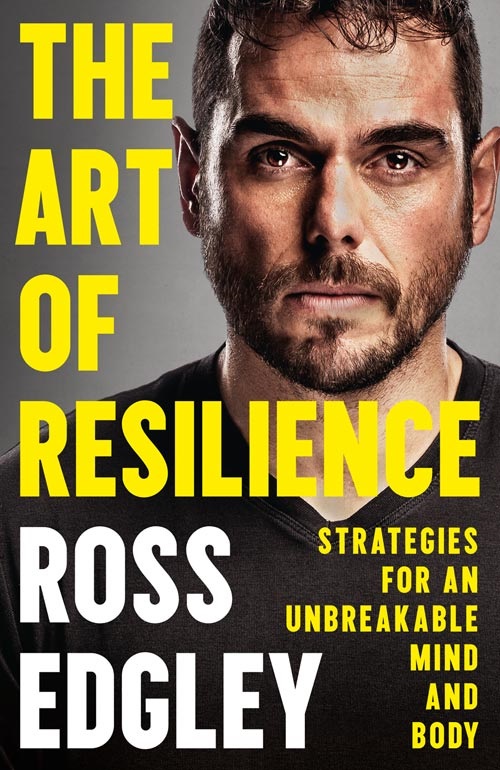
In November 2018, elite athlete Ross Edgley achieved something no human being has ever managed before. After 157 gruelling days spent in the water, he became the first person in history to swim around the entire coastline of Great Britain.
During that record-breaking 1,780-mile swim that began and ended in Margate, Ross consumed a mammoth half a million calories, which was quite impressive considering he lost chunks of his tongue, experienced countless jellyfish stings and was adopted by a Minke whale.
With his brilliant book, The Art of Resilience, having just been released, we spoke to Ross about the mindset needed to take on such an incredible challenge, the injuries he picked up along the way and the mountain of food he had to get through to fuel his body.
The MALESTROM: Where did the idea for the swim come from? Originally it was meant to be a swim in Bermuda, so things changed a bit from that…
Ross Edgley: They really did. The reason we started the whole thing changed a lot as we went around. At the beginning it was a sportsman’s bet that went right or wrong depending on how you look at it.
When we started and I was in the English Channel, I thought, this feels like Captain Webb. So that was brilliant. But then by the time I reached the top of GB, it became something completely different with the news of my Dad being ill and him saying you have to finish this for reasons relating to Maslow’s hierarchy and this idea about self actualisation and being the best person you can be.
It was really weird that the whole reason it started had changed by the time I had finished. That’s why I said this wasn’t an individual event, this has been everyone’s. I knew the only way this should really finish is if it’s shared by everyone. And that’s why we did that big swim in, which was amazing.
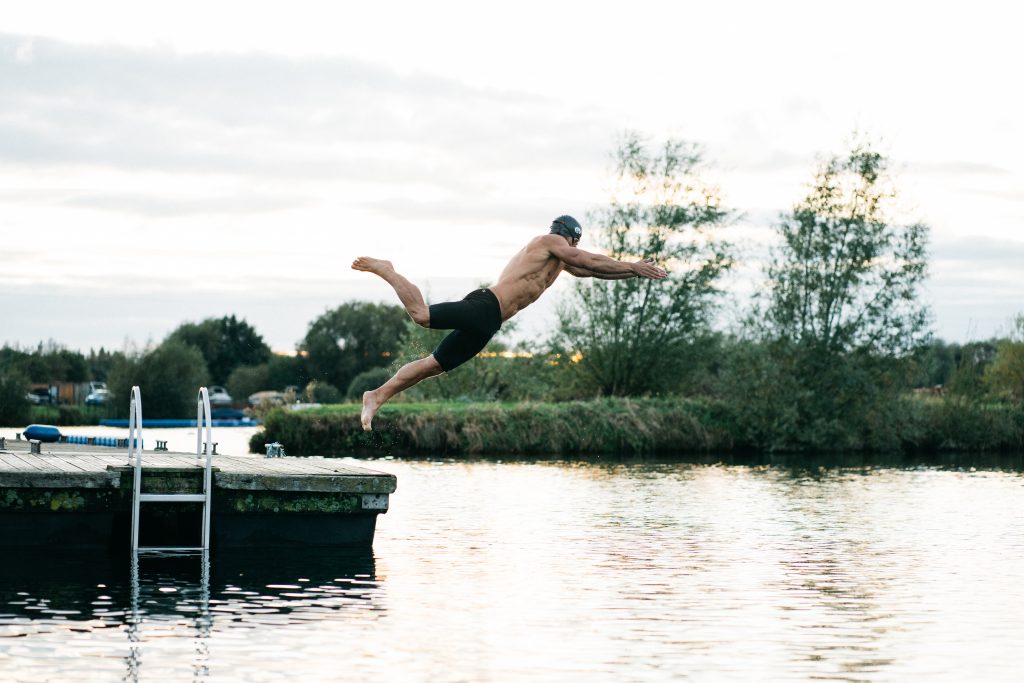
TM: We’ll come to that moment shortly. First I just want to talk about mindset. There’s so much mental resilience required to take a challenge of this magnitude on. How did you even begin to get your head right for it?
RE: I think things such as training with the Royal Marines really helped, cause I just realised that swimming, as a lot of people understand it, is within the realms of conventional sport and people go swimming, I get that. They think about a swimming pool or maybe if you’re an open water swimmer you think about Windermere lake.
But, as soon as you step outside and you start swimming around John O’ Groats, Land’s End, the Irish Sea, which is like a graveyard for ships, Corryvreckan with its giant whirlpool, Pentland Firth with those strong tides, it’s no longer swimming as certainly I understood it myself.
So, that’s why I ended up speaking with the Royal Marines talking about sleep deprivation and coping with sheer adversity along with a lot of friends in the sailing community, because it became more of a sailing adventure that it was swimming in many ways. You could be the best swimmer in the world, you could be Michael Phelps, but you’ll go backwards if you don’t understand the tides of Pentland Firth.
The other thing is, to get into the right mindset, quite a lot of people construe that as ‘getting psyched up’, ‘grit your teeth’ and ‘get focused’ and a lot of those cliched sayings, whereas what I talk about in the book is this idea that resilience is the strategic management of suffering.
So, what I knew was to be resilient. I had to just set off and limit limitations as they came up, because you’re trying to control the inevitable breakdown of the body and the body was just breaking down, I left pieces of it all around Great Britain. So when people say get in the right mindset to be resilient it’s like yeah, but not how a lot of people think about it. It’s more about having that really stoic sports science approach.
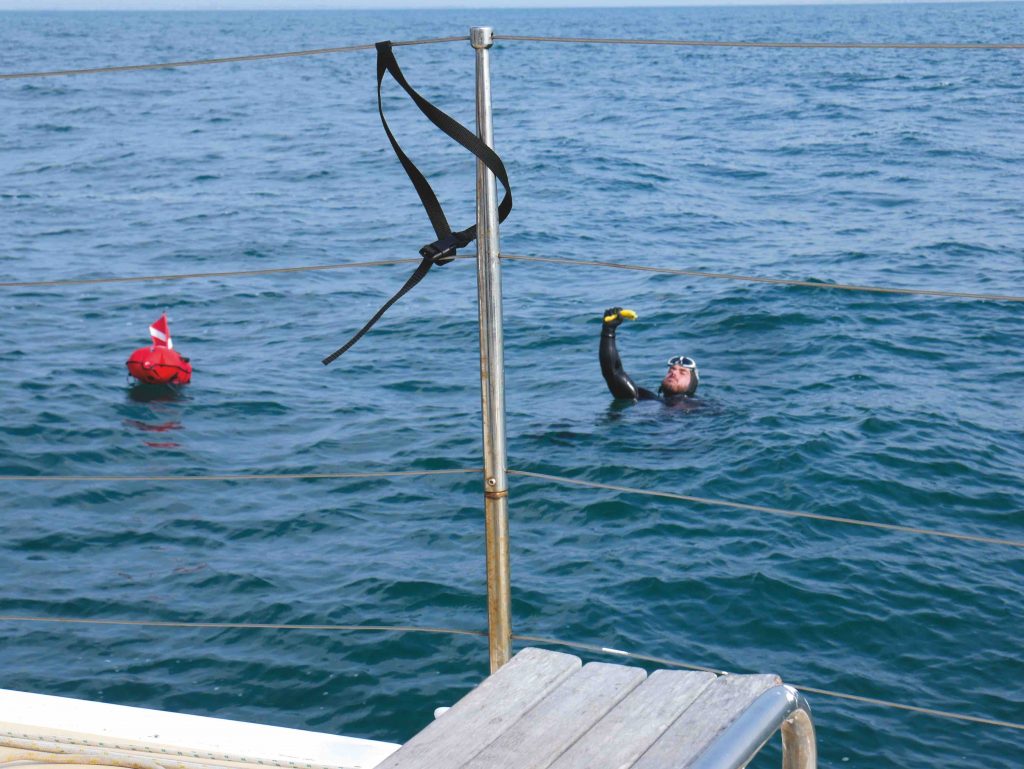
TM: Can you break down the meaning of stoic sports science for us?
RE: To attempt this swim I needed two things and I didn’t quite realise that at the start. It was the fusion of stoic philosophy, ancient Greek philosophy that’s thousands of years old and basically teaches you to keep your emotions in check in adverse conditions. To control the controllable and accept the uncontrollable.
For me I had to segment every single day, week, month, tide, into what was controllable. So, I can swim six hours when the tide’s in my favour. It’s also prehab, rehab, nutrition, all of those things are in my control, but what isn’t in my control is how many jellyfish are going to motorboat my face through the night, and shipping lanes along with the two storms, Ali and Callum, which I had no control over.
Once you understand that and you fuse it with principles in sport science, what you have is quite a powerful combination of this sporting/fitness philosophy. But you can’t have one without the other, because sport science teaches you to be well-rested, have pre-workout nutrition, post-workout nutrition.
For me, I was just eating all day everyday because there’s no pre or post when you’re swimming for 12-hours a day. That’s basically what it is, it’s stoic sports science takes principles of sports science and forges them in the heat of battle.
TM: You mention in your book a central theme of stoicism – ‘It’s not about learning a lesson, it’s about practising a lesson.’ This was something that you did practically to help you complete the journey you were on…
RE: That’s what I like about stoicism, it’s just so pragmatic, you have to live it. It’s not a philosophy where you sit in the classroom and theorise about this that or the other, you roll your sleeves up and you get in. When you read about the ancient stoics like Marcus Aurelius, he wasn’t very well, but he outlived a lot of his healthier counterparts, survived plagues and wars, it was crazy.
So, looking at the stoics and the conditions they survived in, a modern example being Admiral James Stockdale and the Stockdale Paradox, which I talk about in the book, that really resonated with me, because when I look at sports science, there are examples with Emil Zatopek and Eliud Kipchoge, but I needed both. Sometimes I needed to think like a prisoner of war, without trying to sound too morbid, and the coping strategies that they used for isolation.
TM: In terms of the injuries you faced, it’s hard to look past your tongue being shredded by the salty seawater. Maybe tell us about that and how your body was breaking down continually throughout the whole swim…
RE: What’s been nice since coming back on land is to actually speak to people who would understand that. At the time I remember thinking, is this the penance you have to pay to swim around Great Britain? If the ocean wants a piece of my tongue then so be it. It’s a weird mindset to be in.
A good friend of mine, former world’s strongest man Eddie Hall, when he talked to me about his historic half a tonne deadlift, he nearly went blind after it and really put his body on the line.
I asked him if it was worth it? He said it was, to immortalise the Eddie Hall name in history, that it was to lift that weight for something bigger than himself and to prove human potential. All of those things that he lists, I was like yes! That’s why I was prepared to lose my tongue.
There are a few people like Eddie, who since coming back on land, despite coming from different sporting backgrounds, completely get it. Another one is Dan Hardy, a good friend of mine.
I remember speaking to Dan about it and he was like, “oh no I get it.” I said, “what do you mean?” He said, “before I used to walk out to the Octagon, I used to neatly fold all of my clothes perfectly in a nice little pile.” I asked him why he did that and he said, “It’s like a samurai, I knew was going into battle and if I died and went out my shield, or went to the hospital, I knew that my the kindest thing I could do for my family and friends is that they could just pick up all my clothes really neatly and just bring them to the hospital for me. And when I came around conscious, I could put them on. But if I win then they’re neatly folded as well, so it’s win-win.” I thought that was amazing.

TM: Let’s talk about your experiences with the wildlife out there. There were the jellyfish – at one stage while swimming through the Corryvreckan you literally wore a tentacle. And there were other sights like a Baskin Shark. For all the staggering beauty there was also some serious pain…
RE: I’m so glad you brought that up. For all of the hardship, there were some amazing things. Although the jellyfish weren’t that pleasant, they do not tickle, especially the Scottish ones!
What was amazing was the wildlife, the grey seals of Lundy Island, Robin Hood’s Bay. Of course, there was the story about my Minke whale mum in the Bristol Channel. That was one of the best things about the whole swim because I was very aware of the hierarchy of the ocean, I was really low down the pecking order.
We, humans, are awful at swimming, in comparison. What was really funny was, swimming past Lundy island, for instance, all the seals are kind of looking at me like what is that?
They’d been watching me for ages because they could track me and they were aware of me before I was aware of them, it wasn’t until about 36 hours into a long swim across the Bristol channel that they actually made themselves known to me. They were just kind of like, oh he’s really slow, we don’t know what it is, it looks human, it’s pretty hairy and chubby.
That was one of the nicest experiences. Although we avoided wildlife and didn’t want to disturb anything at all, it was amazing that they took such an interest in me as I just tried to carry on my way around Great Britain.
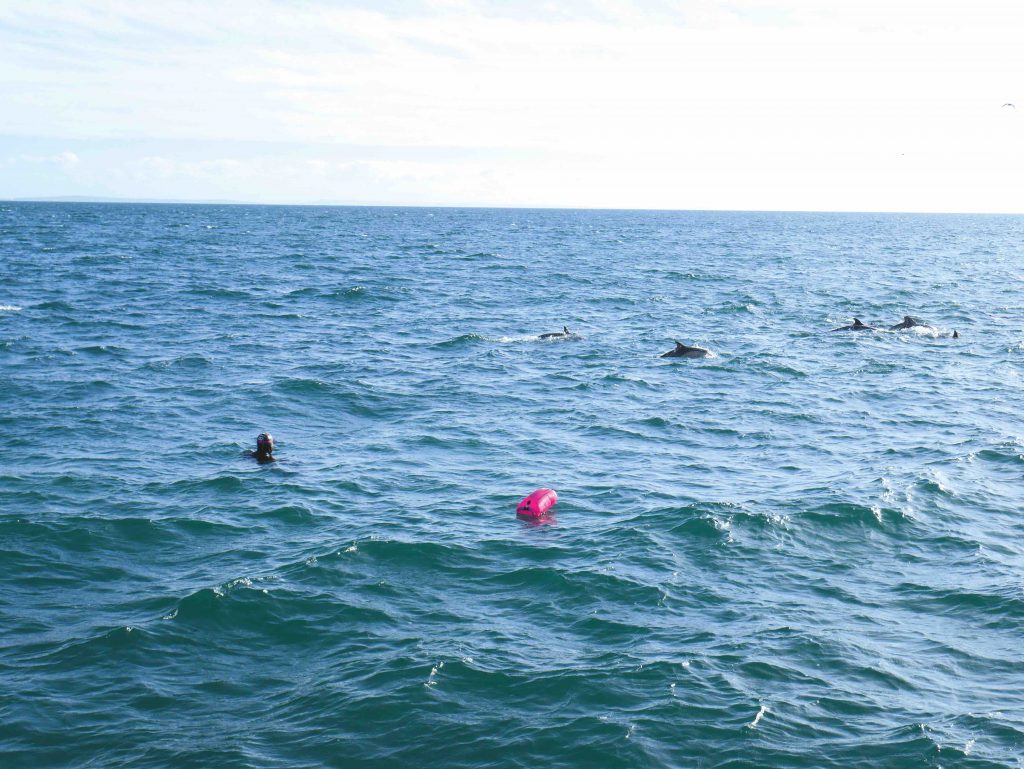
TM: The number of calories you had to put away each day (10,000 to 15,000 calories per day) will be incomprehensible to many. It would seem you’d have to be constantly eating to get that amount in you?
RE: It was like that. I joked and said it was just an eating competition with a bit of swimming thrown in, but it genuinely was. Because what people started to understand and I certainly did about the swim, was that it comes back to just trying to control the breakdown of the body.
So, for instance, if you start looking at an Iron Man, you’re out there for half the day, that’s pretty long. A lot of people will say, Iron Man, that’s brutal. Then if you start looking at ultra marathons, some of those go over a few days, they are absolutely brutal.
You can grit your teeth, load up on caffeine and get through that. Whereas what starts to get really interesting about the GB swim was, you can’t do that, you can’t grit your teeth and try and get through it because it’s so long
So, it’s your immune system, its neurotransmitters, chemical signals in the brain that are related to motivation that are just fried. Your adrenal gland, your central nervous system. It really got quite intricate that you were basically playing with the boundaries of common sense and chronic fatigue. Again that’s why it was so valuable chatting to the Royal Marines, cause they were used to operating at that level of fatigue.
When it came to food, you were just asking so much from your body, that I just found one of the best things that you can possibly do is at least try and give it everything it needs. That means meeting your calorie requirements, as well as making sure your macro needs are met, so proteins, fats and carbs. But it gets even more intricate than that. So, phytochemicals, enzymes, vitamins, minerals, gut bacteria, even going down that sort of rabbit hole.
When you start thinking about the foreign bacteria that I probably ingested all the way around, it’s not even like you can treat it as such and that was the really weird conversation constantly.
I often felt a bit sick, but of course, had no idea what it was. I’m swimming through shipping lanes after all! It was the same with jellyfish stings.
In the night I’d taken jellyfish stings to the face and I’d tell Matt and Harriet who were on the boat what happened, they’d studied Marine biology to an extent, they said no problem let’s see how to treat it. “What did it look like?” I said, “I don’t know, it’s pitch black!”
Going back to food, for all the uncontrollable’s, food was controllable, and the very least you can do is give the body what it needs, cause you’re asking so much of it.
TM: Another notable thing to come out of the swim was the change in the shape of your body. Was that something that was expected?
RE: That’s a good point. It resonated with a lot of people, I never thought that this would be a message of the swim, to make yourself an instrument, not an ornament. I had rugby players saying they were always a bit conscious of their legs cause and can’t buy jeans, who realised that their quads are a byproduct of being a great rugby player.
I had female rowers saying they were always a bit conscious because having shapely backs any large lats, they can’t fit in dresses, who said they were now proud of those lats. I thought that was amazing. Even though I’d love big lats and quads, instead I just looked like a chubby, sea-dwelling Santa Claus by the end of it! I had a beard and a belly.
It just goes to show how adaptable the human body is. I think what was really quite nice is that idea of just getting back to quite a primitive version of what a human probably looked like. So, hairy, chubby, fits a purpose to exist in the Scottish waters in an Arctic storm.
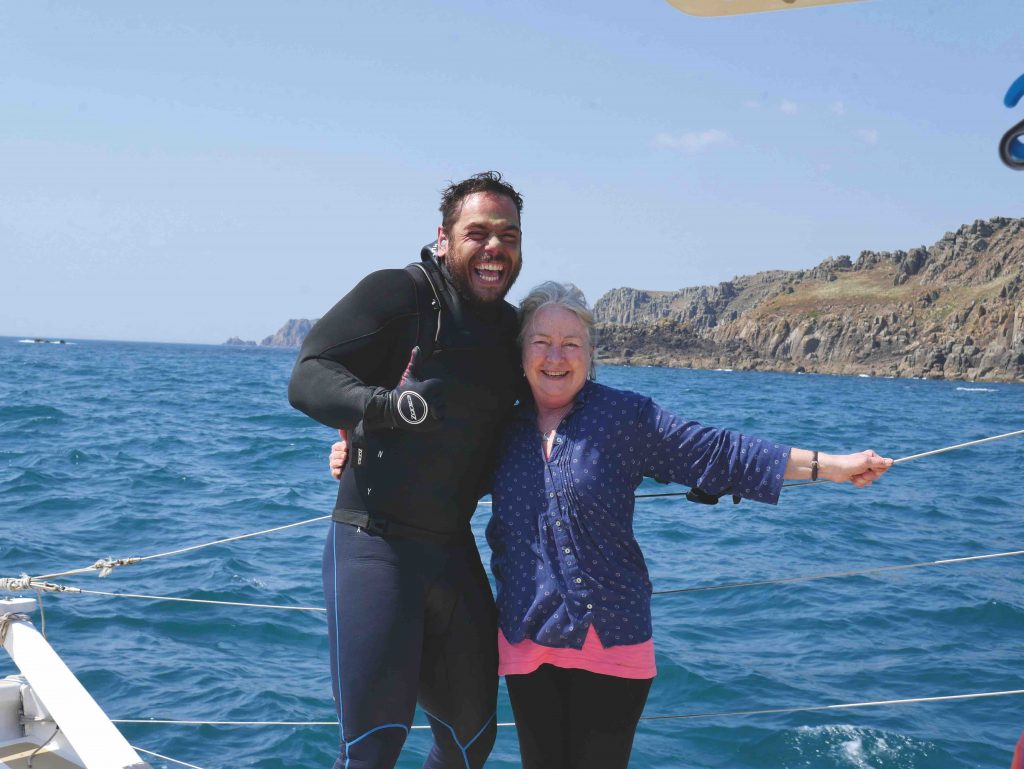
TM: Did it feel good to prove those doubters wrong that you could do this. Because there were plenty who didn’t think you’d even make it partway round. Was it nice to essentially stick two fingers up to them?
RE: It was a bit weird actually. It wasn’t too long ago I had to go through some of the first episodes that were on Red Bull. It was fun watching some of the comments from the live feed. Some people were brutal!
I can look back and laugh now, but I think what was really nice is seeing those comments, and there were a lot of negative ones at the start, he’s too musclebound, too short, looks like a Hobbit. And I agreed to an extent, as you’ll know from my doom diagnosis body scan in the book.
But what was really nice was by the end, what happened is a lot of those people had dwindled out and all that was left was this collective tribe that existed online from all over the world who were saying things like, I’ve been putting off my first Ironman and now I’m going to do it. It was lovely that people were saying Ross, you’re really brave and you’re really fit and you’re going to do this. But I’m none of those things, honestly, I’m an idiot. I said,
“I’m naive enough start and I’m stubborn enough to finish.”
I said it as a bit of a throwaway comment, which again seemed to resonate with people. It’s nice that even now I get people tagging me when they’ve done their first 100-mile ultra marathon and they’re at the finish line saying, naive enough start and stubborn enough to finish. I get goosebumps every time I see it.
To come back to your original question, it wasn’t necessarily nice to put two fingers up at people, but what was best was by that final swim in, you couldn’t see a single Internet troll or negative comment, because it was just seemed to bring together people who understood the power of and athletic adventures and they got it. That’s what was really nice.
TM: Tell us about that scene as you swam into the finish line at Margate. You had the Royal Marines there, who’d arrived in military kayaks and all your friends and family, including your Dad who hadn’t been well. What was that moment like?
RE: It’s still a bit of a blur. I was handed a microphone and I said some words, I don’t know what they were. It was 157 days of oppressed feelings. I just knew I couldn’t afford to celebrate around Lands End and John O’ Groats.
A lot of people said it was amazing that I didn’t cry on the Great British swim and that I was so brave. I’m like no, I wanted to cry lots, but I just knew, according to stoic sports science, if I cried for an hour then that’s an hour I’m not sleeping or eating.
So, there’s literally no point and also this idea of really look at it logically, no one was making me do it. I said I was going to do it, so if you want to complain or cry, or stop, then stop and go back to land. No one is forcing you. All of those feelings had been oppressed for the whole 157 days.
Coming back on land I wanted to laugh, celebrate, cry, hug my Dad, all of those things. I was just kind of shell shocked. I ended up eating pizza in the shower for about an hour.
My girlfriend and my brother knocked on the door to ask if I was ok? But I was literally just indulging in a warm pizza and a shower. For all of the things I imagined I’d want to do when I finish, like celebrate with champagne, all I wanted to do was hug my parents, my family, then get warm and maybe have a shave. That’s all you want to do. And you’ll be happy. That’s the best thing in the world.
TM: How hard was it adjusting back to life on land after so long out at sea and only sleeping on the boat?
RE: There wasn’t really much time because we went straight onto the media tour over in America, which was great because it was nice seeing how they got it. They were like, wow, Great Britain, that’s a big swim! Then Australia was so supportive as well.
In terms of adjusting back to life on land, I think physically for quite a while, I was used to training – moving for 12 hours a day, so I kind of had that work capacity, but I remember going up to the fells, I wanted to go up Castle Crag. I ended up going with a few friends who were all fell runners. I had the work capacity, so I wasn’t even breathing heavy, but my legs were done. Honestly after half a kilometre, maybe not even that, they were done.
I used the fells for a while to work my way up to enjoying running, not worrying about any speed, but just to get my legs functioning again. The main thing was just getting back to a sense of normality.
Just being home with my family was really nice, because they knew the reasons I did it. All I wanted was a Sunday roast dinner, my Mum’s homemade cheesecake and that’s all I need. So, mentally not so much, but physically it absolutely took me a fair old while to get my land legs back.
TM: And what about training during the lockdown? You’re still managing to fit in a bit of swimming?
RE: Only just recently because of the lockdown restrictions being relaxed. Before that not so much. I’ve got a squat rack at home so I’ve been doing a lot of prehab and rehab on my shoulders.
So, a lot of brachiating, which is passive hanging. Theories around that being, that we share a shoulder joint without our great ape ancestors. They were breaking and swinging the shoulder joint, using it as Mother Nature intended. Whereas we’re hunched over typing for 8 hours a day.
It’s been nice to do that. Even in the outside world as it were, if I was in a gym hanging from a squat rack for 30 minutes, people would be like, what are you doing mate? I need to use the squat rack.
Again it’s stoic sports science, control the controllable. What can I do? I was determined to emerge from lockdown with bulletproof rotator cuffs and that’s essentially what I’ve done.
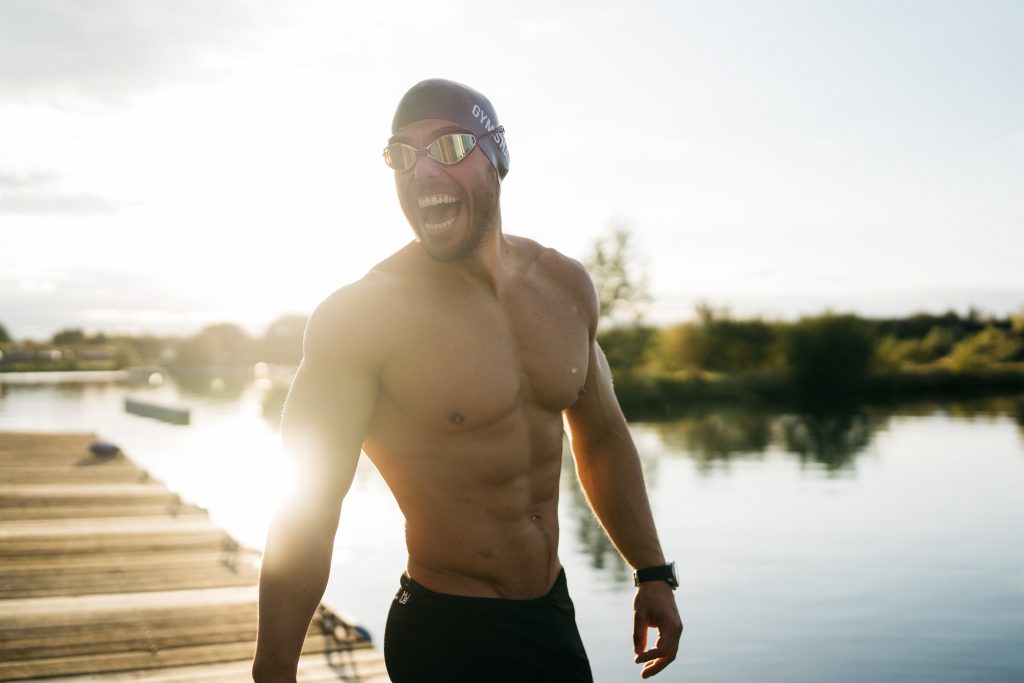
TM: Can we finish by getting the main lessons you learned from this monumental swim? What did you take away from it?
RE: Michelle Foucault was a French philosopher who said, “I’m no prophet, my job is making windows where there were once walls.” I think in so many ways that’s what I wanted to do with the GB swim. I was just a guinea pig using my body as an experiment.
What the book does is reverse engineer and deconstruct the whole swim to hopefully prove to people that there really wasn’t anything special about me or the swim and these strategies are available to all of us.
So, when we talk about Central Governor Theory, the psychobiological model of fatigue and the 40% rule the Royal Navy Seals have, it’s exactly the same thing.
When we talk about the science of the smile, Frontiers in Human Neuroscience, that Journal study that we reference and your perception of fatigue. And equally cheerfulness in the face of adversity, one of the mottos from the Royal Marines, they all bring exactly the same thing.
Hopefully, by reverse engineering and deconstructing the Great British swim in the way that we have done in the book, people can realise that these powerful strategies are available to us all and hopefully people will use them to go on their own fitness pilgrimage, their own Okugake as we call it in the book with the Yamabushi monks.
If people do that then the jellyfish stings and the tongue nearly falling out will be all worth it. If I get messages from people saying Ross, I’ve just done my first 10K, my first 100K, my first Ironman using these principles, they may have wanted to stop, but now understand the psychobiological model of fatigue, then that’s amazing.
It’s all about proving that resilience is suffering, strategically managed. Then hopefully we can create this tribe of scholar-athletes, to quote Plato.
The Art of Resilience by Ross Edgley is published by HarperCollins, out now
Click the banner to share on Facebook



